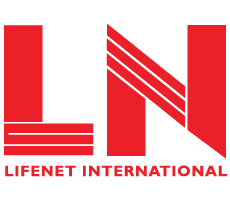THE MODEL
THE LIFENET WAY IS SUSTAINABLE & SAVES LIVES
LifeNet is a social (conversion) franchise. Health facilities are owned and operated locally and, when they join the franchise, have access to LifeNet’s training, quality assurance, supportive supervision, and branding. The LifeNet model targets existing networks of faith-based health facilities in sub-Saharan Africa, equipping each with a suite of high-impact interventions and ensuring they attain and maintain quality care for the long term.
The LifeNet model is based on the belief that the answers to African health crises lie in the hands of skilled African healthcare providers. By strengthening local capacity in every link of the healthcare delivery chain, we can transform primary care for some of the most vulnerable communities in the world. We are dedicated to strengthening health systems by leveraging existing resources to maximize return on investment and promote local sustainability. With this emphasis on local sustainability, as well as impact and scale, LifeNet draws on innovative business principles to build in-country capacity and generate long-term effect.
THE MODEL
THE LIFENET WAY
CENTERS AROUND FOUR PROGRAM VERTICALS:
1. MEDICAL TRAINING
LifeNet’s 5 modules of in-person medical training and mentoring in clinical best practices are based on internationally recognized standards of care and directly tied to saved and improved lives. Through this hands-on education, LifeNet equips health workers with the knowledge and tools they need to provide safe, effective, and evidence-based care to patients. The modules of training include maternal and neonatal best practices, nursing basics, infection prevention, disease diagnosis and treatment, chronic disease care, and much more. Empowered by LifeNet trainings, health workers are equipped to save and improve the lives of underserved patients by implementing evidence-based best practices in their health facilities.
2. MANAGEMENT TRAINING
LifeNet’s 4 modules of management training improve financial sustainability and ensure that health facilities can operate in a safe and functional manner. LifeNet equips staff members with practical training in financial management, human resource management, inventory management, logistics, and administrative best practices. This empowers health facility staff members to keep accurate budgets, maintain pharmaceutical stocks, reduce employee turnover, and build lasting facility sustainability.
3. MENTORING AND SUPPORTIVE SUPERVISION
Alongside training, LifeNet provides mentoring and coaching to staff in each partner health facility, offering supportive supervision to health workers to augment the training they receive. With data gathered through rigorous monitoring and evaluation processes, LifeNet trainers can provide follow-up training that is tailored to difficulties health workers are facing in each facility. This informed and hands-on supervision is an effective means of ensuring long-term behavior change among health workers and system change in health facilities. Supportive supervision includes follow-up training to reinforce what is learned through the training curricula as well as learning reinforcement tools including checklists and posters.
4. DIGITAL LEARNING TOOLS
Augmenting in-person training and support, LifeNet partners now have access to digital learning reinforcements and tools, including a Moodle-powered learning platform where they can access LifeNet trainings, a WhatsApp COVID-19 chatbot, WhatsApp peer learning groups, and more.
5. EQUIPMENT SUPPLY
LifeNet seeks out opportunities to collaborate with third-party equipment donors to provide subsets of healthcare facilities with essential medical equipment and supplies. All medical equipment is provided alongside training to ensure the proper use and maintenance of equipment, safeguarding the long-term use and effectiveness of each piece of equipment.
6. MONITORING, EVALUATION, AND LEARNING (MEL)
LifeNet provides ongoing, rigorous monitoring and evaluation alongside all interventions, ensuring long-term behavior change. This includes regular quality assurance visits that serve to measure and evaluate our success in meeting all project objectives and overall project goals.
WE ARE TRANSFORMING AFRICAN HEALTH CENTERS TO PROVIDE QUALITY, SUSTAINABLE HEALTHCARE, BUT WE NEED YOUR SUPPORT.
CONNECT WITH US
IN THE US
LifeNet International
PO Box 21457
2300 18th St NW
Washington, DC 20009
+1 (202) 480-9002
IN BURUNDI
LifeNet International
26 Avenue Ngendandumwe
Bujumbura, Burundi
IN UGANDA
Lifenet International Uganda
Princes Anne Drive, Plot 56 Bugolobi Kampala Uganda
IN DRC
IN MALAWI
LifeNet International
Off Presidential Highway,
Plot Number 116, Area 14
Lilongwe, Malawi
IN KENYA
Lifenet International Kenya
Juimia Place
Lenana Road, Nairobi Kenya
IN GHANA
LifeNet International
30 Spiess Loop, McCarthy Hill
Accra, Ghana
EMAIL US: contact@lninternational.org
NEWSLETTER SIGNUP:
Subscribe for updates and latest developments.
INSTAGRAM FEED, CLICK HERE TO FOLLOW US ON INSTAGRAM
SOCIAL INNOVATION IN HEALTH INITIATIVE
We were chosen as one of 25 high impact healthcare delivery solutions for the
2015 Social Innovation in Health Initiative, in partnership with the World Health Organization.
